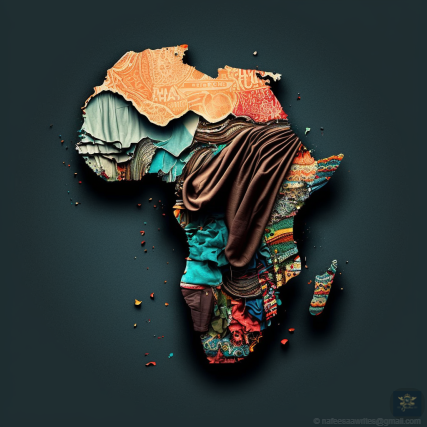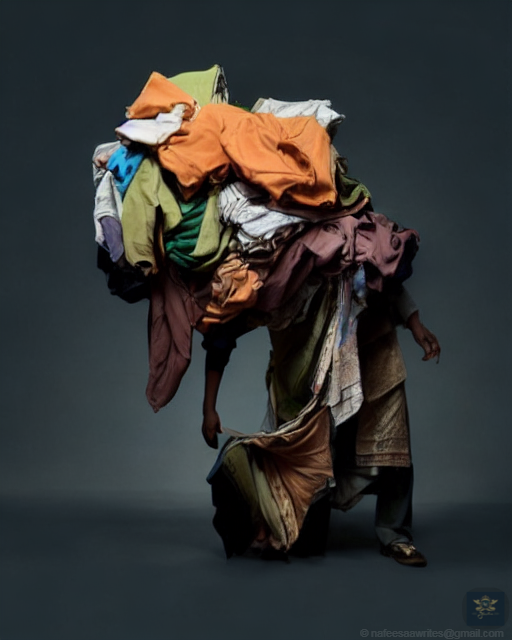The Environmental Impact Of Fast Fashion On Landfills
Introduction
Fashion has always been a canvas for self-expression, a way to showcase our individuality to the world. But what happens when the fabric of this canvas is woven from the threads of exploitation, pollution, and greed?
Now, picture yourself standing at the edge of an endless expanse of land, staring at an imposing sight that towers over the horizon: a mountain of discarded clothing. The sheer magnitude of the pile stretches as far as the eye can see, representing a haunting monument to our wastefulness and disregard for the impact of our actions.

The stark contrast between the colors and textures of the fabric woven together haphazardly, adds to the overwhelming sense of chaos and disarray. This image is a striking representation of our collective addiction to fast fashion and the toll it takes on our planet.
Fast fashion is a trend that has spawned an industry built on the pillars of cheap prices and rapid turnover. It's a culture of instant gratification, where the thrill of a bargain overshadows the true cost of the clothes we wear. Yet the real cost of fast fashion extends far beyond our wallets. It's a cost paid in carbon emissions and polluted water, exploited laborers, and overflowing landfills. With fast fashion responsible for a staggering 10% of global carbon emissions and 20% of global wastewater, it's time to ask ourselves: Is this the true cost of fashion?
The Devastating Effects Of Fast Fashion On Landfills
Fast fashion is a ticking time bomb with landfills worldwide, bearing the brunt of its explosive impact. As consumers, we've been conditioned to see clothing as disposable, leading to a monumental amount of waste generated each year.
And while this waste takes many forms—from plastic packaging to textile scraps—it's the mountains of discarded clothing that are the most visible evidence of fast fashion's environmental impact.
The amount of clothing produced and consumed around the world has exploded in recent years, with many pieces of clothing ending up in landfills within just a few months of being made. And while some may argue that these clothes will eventually decompose, the reality is that many synthetic fibers can take centuries to break down, releasing harmful chemicals into the environment in the process. This lack of biodegradability of synthetic fibers used in fast fashion production means that clothing waste can take hundreds of years to decompose, leaving a lasting impact on the environment.
African Case Study: The Harsh Reality
This problem is particularly acute in Africa: the continent that embodies a rich cultural heritage is now facing the harsh reality of fast fashion's impact on its landfills. The clothing industry's insatiable appetite for producing and consuming fast fashion has resulted in an alarming amount of clothing waste being generated in Africa. The sheer volume of textile waste being disposed of in landfills has caused a significant strain on the already limited landfill capacity.

The continent's limited waste management infrastructure is being pushed to the brink. Landfills overflow with discarded clothing, with toxic pollutants and chemicals leaching into the soil and water, and communities are left to deal with the consequences. The impact of fast fashion on landfills is not just about the physical waste, either. The production of cheap clothing requires vast amounts of resources, including water, energy, and raw materials. This leads to deforestation, air, and water pollution, with the depletion of natural resources. Moreover, the workers in the fashion industry are often paid poverty wages and subjected to hazardous working conditions. This is a result of a system that prioritizes profit over people and the planet.
Harnessing The Power Of Sustainable Fashion: Crafting A Tapestry Of Change
As the fashion industry continues to contribute to environmental degradation and social inequality, we can take a stand and make a difference. We hold the key to unlocking a more sustainable future. Like weavers in a loom, our choices and actions can craft a tapestry of change. Will we choose to continue down the path of fast fashion, with its destructive impact on our planet and communities? Or will we embrace the beauty and power of sustainable fashion, where each garment tells a story of responsible production and consumption?
We can cut the threads of overproduction and waste by reducing our consumption and supporting sustainable and second-hand clothing. We can unravel the harmful effects of fast fashion and re-knit a new fabric of ecological and social integrity. Will we prioritize our long-term impact on the world we share, or let our desire for instant gratification and fleeting trends dictate our wardrobe choices?

Advocating for more responsible industrial practices is also crucial. We can demand greater transparency and accountability from the fashion industry and encourage a shift towards circular, ethical, and inclusive production models. Will we push for a brighter and more just future for all? Or will we accept the status quo of exploitative labor, toxic chemicals, and unsustainable resource use?
Despite the challenges, there are many global initiatives and projects, particularly in Africa, aimed at promoting sustainable fashion and reducing clothing waste. Many African organizations, designers, and entrepreneurs are also embracing sustainable fashion practices, creating beautiful clothing that is both eco-friendly and socially responsible. The Larry Rowbs Foundation is one such organization that is helping to build a more sustainable and equitable fashion industry in Africa. By supporting education and training programs, the foundation is helping to build a more sustainable and equitable fashion industry.
Re-Imagining The World Of Fashion
So let’s get back to where you stood: the precipice of that vast landfill, the daunting expanse of waste stretching out before you—it's easy to feel overwhelmed and powerless. But take heart, for there is a way out of this seemingly endless cycle of waste and destruction.
Let us all picture a world where we embrace sustainable fashion practices, where clothing is cherished and cared for, and where the textile industry prioritizes ethical and eco-friendly production. It may seem like a far-off dream, but it's a vision that's within our reach.
- Introduction
- The Devastating Effects Of Fast Fashion On Landfills
- African Case Study: The Harsh Reality
- Harnessing The Power Of Sustainable Fashion: Crafting A Tapestry Of Change
- Re-Imagining The World Of Fashion
Your Support Is All We Need.
Larry Rowbs foundation aims to make the fashion industry more sustainable and safeguard its workers.
But for this we need support from our community. We invite you to be a part of this cause by any of the following:
Continue Exploring
JOIN THE MOVEMENT!
Stay up to date with the roadmap progress, announcements and events conducted by signing up for our weekly newsletter.
Website by k34a